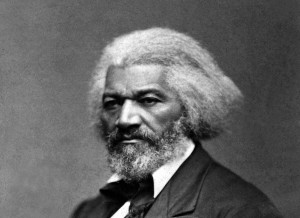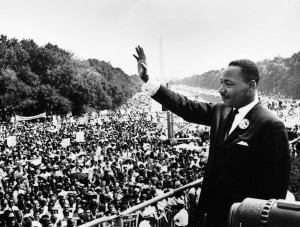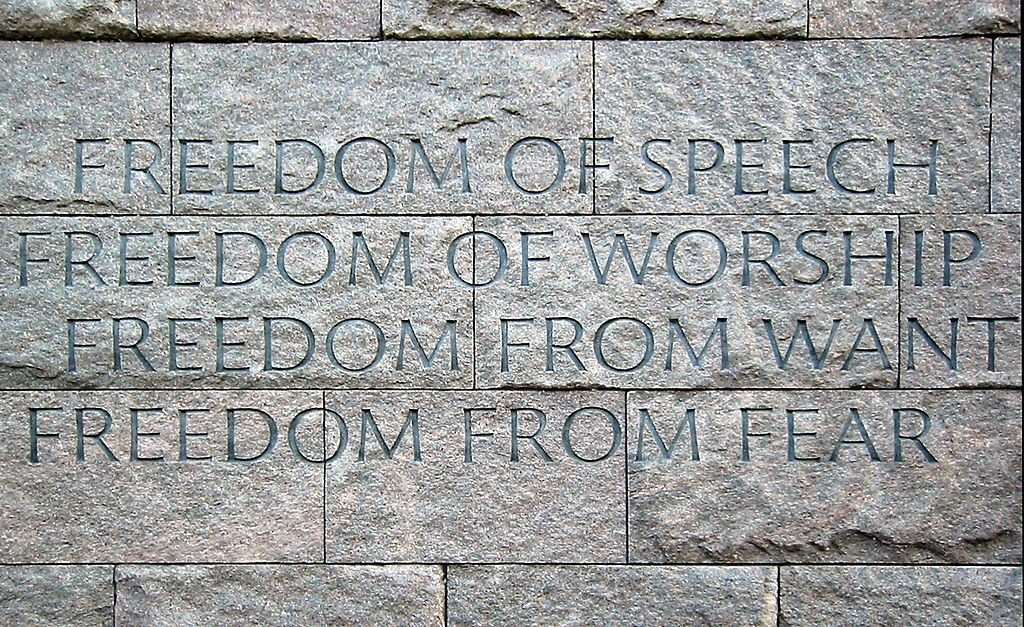
Would you have me argue that all human beings are equal?

Frederick Douglass was a remarkable worker for human rights. Although he lived more than a century ago, his thoughts remain pressingly relevant.
He began life as a slave, but winning his own freedom, he fought not only for abolition of slavery but also gave his support to other human rights causes, such as the emancipation of women.
Born in 1818 in Talbot County, Maryland, he was separated from his mother at an early age, he writes, as was typically done with slave children. His father, he believed, was his mother’s master. Even though it was against the law for slave children to be taught to read and write, Sophia Auld the wife of one of his master’s brother, began his education. When this was discovered it was put to a stop, but Douglass found opportunities to continue to learn on his own. The fact that it was forbidden told Douglass that ‘knowledge is the pathway to freedom’. While still enslaved he used his knowledge to secretly teach fellow slaves to read the bible, until their meetings were discovered.
Douglass’ opportunity to escape came when, due to his skills, he was hired out by his master to work for wages (the wages being paid to his master rather than him). Douglass worked at caulking ships and on 3 September 1838 he escaped, disguised as a free sailor, bearing false documents of a free man.
These small details of slavery tell us how it was systematically maintained, the oppressed kept in their servitude by both legal and non-legal devices.
After his escape, Douglass settled in Massachussets and was quickly drawn into abolitionist circles. In 1845 he published his first autobiography telling the story of his early life and escape to freedom, but fearing laws which might allow his legal master to claim his ‘property’ back, Douglass travelled to Ireland, of which he commented:
I breathe, and lo! the chattel [slave] becomes a man. I gaze around in vain for one who will question my equal humanity, claim me as his slave, or offer me an insult. I employ a cab – I am seated beside white people – I reach the hotel – I enter the same door – I am shown into the same parlour – I dine at the same table – and no one is offended… I find myself regarded and treated at every turn with the kindness and deference paid to white people.
Supporters raised funds to purchase legal title from his master and he returned to the United States. In 1848 we find him as the sole African American present at the Seneca Falls Conference which called for the emancipation of women. His life was one of public service and advocacy for the human rights of African Americans, both before and after the civil war.
In the title of this article we adapt words from Frederick Douglass’ 1852, 4th of July speech, which we reproduce in full below. At the time, slavery still persisted in the southern states of the United States.
Of course his point is that for a society which believed it to be self evident that that all men have the inalienable right to the pursuit of life, liberty and happiness, it would be embarrassing to the society itself to have to argue that slavery is wrong. It is obviously so.
Would you have me argue all human beings are equal?
The passage of more than a century and a half has not lessened the embarrassments of society for like Douglass, we might now say ‘Would you have me argue that all human beings are equal?’. Must we argue that it is wrong to violate the human rights of foreigners? Can anyone who believes in democracy seriously argue it? Wouldn’t it be ridiculous, taking Douglass’ insight, to debate fine points of philosophy to establish that which is accepted axiomatically. Indeed it would.
Yet like the institution of slavery against which Douglass fought to both free himself and others, our societies practice human rights violations of the same kind. Violations which makes men and women ‘foreigners’, and having attached that classification to our fellow human beings we are apt to forget their humanity – to strip them of it.
That this is so is obvious, when we recall that we think nothing of depriving a foreigner of freedom, of expelling them from our midst, of denying them the right to work or a voice in government. In our media, we portray the ‘foreigner’ who might cross our border as an invader and an object of fear as someone who threatens our prosperity and very way of life. Such a lack of voice, of legal standing, of social inclusion creates conditions ripe for exploitation, and in many places of the world, this is just what results.
“Human rights abuses faced daily by an estimated two to three million migrant workers in Thailand include violent attacks and killings by government security forces and private individuals, extensive use of torture and ill-treatment in detention, sexual abuse, widespread labor rights abuses, and pervasive extortion. In every region…abuses of migrants were systematic and those filing grievances faced immediate, violent retaliation from a nexus of local police, officials and employers. Severe restrictions on migrants’ rights to establish trade unions, to legally organize groups or associations, and to assemble and express views further reinforce the vulnerability of migrants to abuses.” From Human Rights Watch
http://www.hrw.org/en/news/2011/06/06/thailand-increasing-abuse-migrant-workers
Tens of thousands of migrant workers travel each year to the Central Asian economic powerhouse of Kazakhstan in search of employment. Thousands of these migrant workers, often together with their children, find work in tobacco farming…some employers confiscated their passports, failed to provide them with written employment contracts, did not pay regular wages, arbitrarily deducted their earnings, and forced them to work excessively long hours. Some employers also failed to provide migrant workers with potable water, adequate hand-washing and other sanitary facilities, or adequate living conditions. In the worst cases, workers carried out forced labor, or were subject to situations analogous to forced labor, in which employers confiscated migrant workers’ passports and in some cases required them to perform other work without pay, in addition to tobacco farming. From Human Rights Watch “Hellish Work: Exploitation of Migrant Tobacco Workers in Kazakhstan”
http://www.hrw.org/en/node/94813/section/4
“In their home country – Bangladesh or the Philippines or India – these workers are told they can earn a fortune in Dubai if they pay a large upfront fee. When they arrive, their passports are taken from them, and they are told their wages are a tenth of the rate they were promised. They end up working in extremely dangerous conditions for years, just to pay back their initial debt. They are ringed-off in filthy tent-cities outside Dubai, where they sleep in weeping heat, next to open sewage. They have no way to go home. And if they try to strike for better conditions, they are beaten by the police. I met so many men in this position I stopped counting, just as the embassies were told to stop counting how many workers die in these conditions every year after they figured it topped more than 1,000 among the Indians alone.” Johann Hari A morally bankrupt dictatorship built by slave labour The Independent 27 November 2009.
Indeed so closely is the condition of ‘foreignness’ associated with practices that we regard as slavery, that it led US Ambassador at Large for Modern Day Slavery, John R. Miller, in his article Call it Slavery, to observe:
Today’s slaves are not dragged off in chains, but they are just as effectively deprived of their freedom by force or threats. They are bought, sold, and leased. … In most countries, what distinguishes the victims is not their color but their foreignness or otherness. Most of the survivors I talked to were attracted by the promise of a job in a distant land. Once there, they found themselves in unfamiliar surroundings and unable to escape.
So let us turn for inspiration to the wisdom of Frederick Douglass in his fight against chattel slavery, for surely his words ring true and all human beings are equal.
__________________
The Meaning of July Fourth for the Negro
Frederick Douglass
Fellow Citizens, I am not wanting in respect for the fathers of this republic. The signers of the Declaration of Independence were brave men. They were great men, too great enough to give frame to a great age. It does not often happen to a nation to raise, at one time, such a number of truly great men. The point from which I am compelled to view them is not, certainly, the most favorable; and yet I cannot contemplate their great deeds with less than admiration. They were statesmen, patriots and heroes, and for the good they did, and the principles they contended for, I will unite with you to honor their memory….
…Fellow-citizens, pardon me, allow me to ask, why am I called upon to speak here to-day? What have I, or those I represent, to do with your national independence? Are the great principles of political freedom and of natural justice, embodied in that Declaration of Independence, extended to us? and am I, therefore, called upon to bring our humble offering to the national altar, and to confess the benefits and express devout gratitude for the blessings resulting from your independence to us?
Would to God, both for your sakes and ours, that an affirmative answer could be truthfully returned to these questions! Then would my task be light, and my burden easy and delightful. For who is there so cold, that a nation’s sympathy could not warm him? Who so obdurate and dead to the claims of gratitude, that would not thankfully acknowledge such priceless benefits? Who so stolid and selfish, that would not give his voice to swell the hallelujahs of a nation’s jubilee, when the chains of servitude had been torn from his limbs? I am not that man. In a case like that, the dumb might eloquently speak, and the “lame man leap as an hart.”
But such is not the state of the case. I say it with a sad sense of the disparity between us. I am not included within the pale of glorious anniversary! Your high independence only reveals the immeasurable distance between us. The blessings in which you, this day, rejoice, are not enjoyed in common. The rich inheritance of justice, liberty, prosperity and independence, bequeathed by your fathers, is shared by you, not by me. The sunlight that brought light and healing to you, has brought stripes and death to me. This Fourth July is yours, not mine. You may rejoice, I must mourn. To drag a man in fetters into the grand illuminated temple of liberty, and call upon him to join you in joyous anthems, were inhuman mockery and sacrilegious irony. Do you mean, citizens, to mock me, by asking me to speak to-day? If so, there is a parallel to your conduct. And let me warn you that it is dangerous to copy the example of a nation whose crimes, towering up to heaven, were thrown down by the breath of the Almighty, burying that nation in irrevocable ruin! I can to-day take up the plaintive lament of a peeled and woe-smitten people!
“By the rivers of Babylon, there we sat down. Yea! we wept when we remembered Zion. We hanged our harps upon the willows in the midst thereof. For there, they that carried us away captive, required of us a song; and they who wasted us required of us mirth, saying, Sing us one of the songs of Zion. How can we sing the Lord’s song in a strange land? If I forget thee, 0 Jerusalem, let my right hand forget her cunning. If I do not remember thee, let my tongue cleave to the roof of my mouth.”
Fellow-citizens, above your national, tumultuous joy, I hear the mournful wail of millions! whose chains, heavy and grievous yesterday, are, to-day, rendered more intolerable by the jubilee shouts that reach them. If I do forget, if I do not faithfully remember those bleeding children of sorrow this day, “may my right hand forget her cunning, and may my tongue cleave to the roof of my mouth!” To forget them, to pass lightly over their wrongs, and to chime in with the popular theme, would be treason most scandalous and shocking, and would make me a reproach before God and the world. My subject, then, fellow-citizens, is American slavery. I shall see this day and its popular characteristics from the slave’s point of view. Standing there identified with the American bondman, making his wrongs mine, I do not hesitate to declare, with all my soul, that the character and conduct of this nation never looked blacker to me than on this 4th of July! Whether we turn to the declarations of the past, or to the professions of the present, the conduct of the nation seems equally hideous and revolting. America.is false to the past, false to the present, and solemnly binds herself to be false to the future. Standing with God and the crushed and bleeding slave on this occasion, I will, in the name of humanity which is outraged, in the name of liberty which is fettered, in the name of the constitution and the Bible which are disregarded and trampled upon, dare to call in question and to denounce, with all the emphasis I can command, everything that serves to perpetuate slavery Ñ the great sin and shame of America! “I will not equivocate; I will not excuse”; I will use the severest language I can command; and yet not one word shall escape me that any man, whose judgment is not blinded by prejudice, or who is not at heart a slaveholder, shall not confess to be right and just.
But I fancy I hear some one of my audience say, “It is just in this circumstance that you and your brother abolitionists fail to make a favorable impression on the public mind. Would you argue more, an denounce less; would you persuade more, and rebuke less; your cause would be much more likely to succeed.” But, I submit, where all is plain there is nothing to be argued. What point in the anti-slavery creed would you have me argue? On what branch of the subject do the people of this country need light? Must I undertake to prove that the slave is a man? That point is conceded already. Nobody doubts it. The slaveholders themselves acknowledge it in the enactment of laws for their government. They acknowledge it when they punish disobedience on the part of the slave. There are seventy-two crimes in the State of Virginia which, if committed by a black man (no matter how ignorant he be), subject him to the punishment of death; while only two of the same crimes will subject a white man to the like punishment. What is this but the acknowledgment that the slave is a moral, intellectual, and responsible being? The manhood of the slave is conceded. It is admitted in the fact that Southern statute books are covered with enactments forbidding, under severe fines and penalties, the teaching of the slave to read or to write. When you can point to any such laws in reference to the beasts of the field, then I may consent to argue the manhood of the slave. When the dogs in your streets, when the fowls of the air, when the cattle on your hills, when the fish of the sea, and the reptiles that crawl, shall be unable to distinguish the slave from a brute, then will I argue with you that the slave is a man!
For the present, it is enough to affirm the equal manhood of the Negro race. Is it not astonishing that, while we are ploughing, planting, and reaping, using all kinds of mechanical tools, erecting houses, constructing bridges, building ships, working in metals of brass, iron, copper, silver and gold; that, while we are reading, writing and ciphering, acting as clerks, merchants and secretaries, having among us lawyers, doctors, ministers, poets, authors, editors, orators and teachers; that, while we are engaged in all manner of enterprises common to other men, digging gold in California, capturing the whale in the Pacific, feeding sheep and cattle on the hill-side, living, moving, acting, thinking, planning, living in families as husbands, wives and children, and, above all, confessing and worshipping the Christian’s God, and looking hopefully for life and immortality beyond the grave, we are called upon to prove that we are men!
Would you have me argue that man is entitled to liberty? that he is the rightful owner of his own body? You have already declared it. Must I argue the wrongfulness of slavery? Is that a question for Republicans? Is it to be settled by the rules of logic and argumentation, as a matter beset with great difficulty, involving a doubtful application of the principle of justice, hard to be understood? How should I look to-day, in the presence of Amercans, dividing, and subdividing a discourse, to show that men have a natural right to freedom? speaking of it relatively and positively, negatively and affirmatively. To do so, would be to make myself ridiculous, and to offer an insult to your understanding. There is not a man beneath the canopy of heaven that does not know that slavery is wrong for him.
What, am I to argue that it is wrong to make men brutes, to rob them of their liberty, to work them without wages, to keep them ignorant of their relations to their fellow men, to beat them with sticks, to flay their flesh with the lash, to load their limbs with irons, to hunt them with dogs, to sell them at auction, to sunder their families, to knock out their teeth, to burn their flesh, to starve them into obedience and submission to their mastcrs? Must I argue that a system thus marked with blood, and stained with pollution, is wrong? No! I will not. I have better employment for my time and strength than such arguments would imply.
What, then, remains to be argued? Is it that slavery is not divine; that God did not establish it; that our doctors of divinity are mistaken? There is blasphemy in the thought. That which is inhuman, cannot be divine! Who can reason on such a proposition? They that can, may; I cannot. The time for such argument is passed.
At a time like this, scorching irony, not convincing argument, is needed. O! had I the ability, and could reach the nation’s ear, I would, to-day, pour out a fiery stream of biting ridicule, blasting reproach, withering sarcasm, and stern rebuke. For it is not light that is needed, but fire; it is not the gentle shower, but thunder. We need the storm, the whirlwind, and the earthquake. The feeling of the nation must be quickened; the conscience of the nation must be roused; the propriety of the nation must be startled; the hypocrisy of the nation must be exposed; and its crimes against God and man must be proclaimed and denounced.
What, to the American slave, is your 4th of July? I answer; a day that reveals to him, more than all other days in the year, the gross injustice and cruelty to which he is the constant victim. To him, your celebration is a sham; your boasted liberty, an unholy license; your national greatness, swelling vanity; your sounds of rejoicing are empty and heartless; your denunciation of tyrants, brass fronted impudence; your shouts of liberty and equality, hollow mockery; your prayers and hymns, your sermons and thanksgivings, with all your religious parade and solemnity, are, to Him, mere bombast, fraud, deception, impiety, and hypocrisy — a thin veil to cover up crimes which would disgrace a nation of savages.There is not a nation on the earth guilty of practices more shocking and bloody than are the people of the United States, at this very hour.
Go where you may, search where you will, roam through all the monarchies and despotisms of the Old World, travel through South America, search out every abuse, and when you have found the last, lay your facts by the side of the everyday practices of this nation, and you will say with me, that, for revolting barbarity and shameless hypocrisy, America reigns without a rival….
…Allow me to say, in conclusion, notwithstanding the dark picture I have this day presented, of the state of the nation, I do not despair of this country. There are forces in operation which must inevitably work the downfall of slavery. “The arm of the Lord is not shortened,” and the doom of slavery is certain. I, therefore, leave off where I began, with hope. While drawing encouragement from “the Declaration of Independence,” the great principles it contains, and the genius of American Institutions, my spirit is also cheered by the obvious tendencies of the age. Nations do not now stand in the same relation to each other that they did ages ago. No nation can now shut itself up from the surrounding world and trot round in the same old path of its fathers without interference. The time was when such could be done. Long established customs of hurtful character could formerly fence themselves in, and do their evil work with social impunity. Knowledge was then confined and enjoyed by the privileged few, and the multitude walked on in mental darkness. But a change has now come over the affairs of mankind. Walled cities and empires have become unfashionable. The arm of commerce has borne away the gates of the strong city. Intelligence is penetrating the darkest corners of the globe. It makes its pathway over and under the sea, as well as on the earth. Wind, steam, and lightning are its chartered agents. Oceans no longer divide, but link nations together. From Boston to London is now a holiday excursion. Space is comparatively annihilated. — Thoughts expressed on one side of the Atlantic are distinctly heard on the other.
The far off and almost fabulous Pacific rolls in grandeur at our feet. The Celestial Empire, the mystery of ages, is being solved. The fiat of the Almighty, “Let there be Light,” has not yet spent its force. No abuse, no outrage whether in taste, sport or avarice, can now hide itself from the all-pervading light. The iron shoe, and crippled foot of China must be seen in contrast with nature. Africa must rise and put on her yet unwoven garment. ‘Ethiopia, shall, stretch. out her hand unto Ood.” In the fervent aspirations of William Lloyd Garrison, I say, and let every heart join in saying it:
God speed the year of jubilee
The wide world o’er!
When from their galling chains set free,
Th’ oppress’d shall vilely bend the knee,
And wear the yoke of tyranny
Like brutes no more.
That year will come, and freedom’s reign,
To man his plundered rights again
Restore.
God speed the day when human blood
Shall cease to flow!
In every clime be understood,
The claims of human brotherhood,
And each return for evil, good,
Not blow for blow;
That day will come all feuds to end,
And change into a faithful friend
Each foe.
God speed the hour, the glorious hour,
When none on earth
Shall exercise a lordly power,
Nor in a tyrant’s presence cower;
But to all manhood’s stature tower,
By equal birth!
That hour will come, to each, to all,
And from his Prison-house, to thrall
Go forth.
Until that year, day, hour, arrive,
With head, and heart, and hand I’ll strive,
To break the rod, and rend the gyve,
The spoiler of his prey deprive —
So witness Heaven!
And never from my chosen post,
Whate’er the peril or the cost,
Be driven.
Image Source: Wikimedia Commons Public Domain http://en.wikipedia.org/wiki/File:Frederick_Douglass_portrait.jpg
Information Sources: Information sources for this article include the wikipedia article on Frederick Douglass, which includes more detail on his life.








